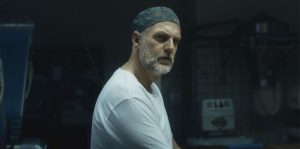
Humans are social creatures. We have within us an innate need for some level of attention and interaction with others that is, to some extent, essential for survival. When that primary condition is denied, people may find themselves going to drastic lengths in order to assert themselves and shout, “I’m here! Don’t forget about me!”
Such is the case with Erik (Troels Lyby), the sensitive subject of director Kristian Håskjold’s short and succinct A Worthy Man. Erik toils away his days kneading dough and making pastries in his bleak basement of a bakery. Try as he might to ignite any spark of pleasure or good-nature into his and his family’s mundane lives by telling lame jokes your Dad wouldn’t think were funny, it is nearly impossible for Erik to reverse his slide downward into depression. Essentially devoid of affection from his wife and kids, the only respite Erik has in the course of his ever more disheartening existence is calling into radio chat shows with the hope of possibly being the caller who tells the funniest joke of the day. But the artifice of this electronic validation only momentarily and superficially boosts Erik’s outlook. His breakdown starts to truly manifest itself when he hallucinates that the talk show hosts are talking about him on-air and that people calling into the show are doing so to discuss what a failure and what a loser Erik is. At this point, it is obvious that Erik is rocketing towards a major emotional breakdown, and only the touch and warmth of another human being will return him to some semblance of sanity.
“…the only respite Erik has in the course of his ever more disheartening existence is calling into radio chat shows…”
Lyby is in practically every scene and does a very good job in his central performance at conveying Erik’s increasingly fragile mental state. Lyby’s Erik has a hunched stance that suitably projects his dispirited demeanor and permits the viewer to register his pain as his wife and kids more-or-less brush him aside. Director Håskjold doesn’t rely on a lot of close-ups in order for the audience to comprehend the emotions on Lyby’s face, but rather keeps his camera a little further away; the better to experience Lyby’s entire body language as he lives out Erik’s plight. The mood generated by the gray and green color scheme in the film’s design further elucidates the despondency and gloom that has become Erik’s day-to-day.
Everyone, man or woman, has moments like Erik’s when we feel ignored or lost or alone. For many, this feeling passes on its own, or with a phone call to a friend or a loved one, or even a chat with a stranger at a bar. But for some, like Erik, the feeling is more acute when faced with avoidance from even the closest of family members. Kristian Håskjold and screenwriter Marianne Lentz have crafted a quick reminder that everyone carries this universal sentiment…and sometimes it is essential that another be the remedy that helps a fellow human being push through and conquer it.
"…a very good job in his central performance at conveying Erik’s increasingly fragile mental state."
